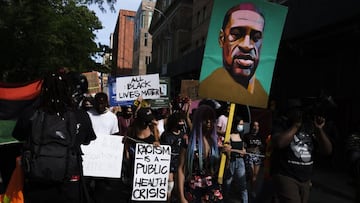Kwanzaa 2023: How did the holiday originate and how is it celebrated?
Kwanzaa is a cultural holiday created by an African American professor and activist in 1996, as a way for African Americans to celebrate their heritage.

Kwanzaa is a holiday that honors African American and Pan-African culture and traditions. It was created in 1966 by Dr. Maulana Karenga, an African American professor and activist, as a way for African Americans to reconnect with their African cultural roots and to foster a sense of community and identity.
The cultural holiday lasts seven days and is observed around the world from Dec. 26 to Jan. 1 each year. It can be honored alongside other celebrations, as it is not a religious holiday.
Kwanzaa’s seven principles
The term “Kwanzaa” is derived from the Swahili phrase “matunda ya kwanza”, which means “first fruits.” The celebration is built around seven core principles known as the Nguzo Saba. Each day of the festivities is dedicated to one of these principles. According to the celebration’s official website, these are the meanings of each for those who observe the tradition.
Umoja (Unity)
To strive for and maintain unity in the family, community, nation, and race.
Kujichagulia (Self-determination)
To define and name ourselves, as well as to create and speak for ourselves.
Ujima (Collective work and responsibility)
To build and maintain our community together and make our brothers’ and sisters’ problems our problems, and to solve them together.
READ ALSO: Boxing Day: Exploring the day after Christmas
Ujamaa (Cooperative economics)
To build and maintain our own stores, shops, and other businesses and to profit from them together.
Nia (Purpose)
To make our collective vocation the building and developing of our community in order to restore our people to their traditional greatness.
Kuumba (Creativity)
To do always as much as we can, in the way we can, in order to leave our community more beautiful and beneficial than we inherited it.
Imani (Faith)
To believe with all our heart in our people, our parents, our teachers, our leaders, and the righteousness and victory of our struggle.
READ ALSO: What is Santa called in other countries?
How is Kwanzaa celebrated?
The celebration involves various rituals and activities that focus on African cultural heritage and community building. Here are some common ways in which Kwanzaa is honored:
Lighting the Kinara
Similar to the lighting of candles in a menorah, Kwanzaa involves lighting the kinara, a candle holder with seven candles. The center candle is black and represents Umoja (Unity). The remaining candles are red and green, symbolizing the African flag’s colors and each representing one of the Nguzo Saba or Seven Principles. One candle is lit each day, starting from the black candle.
Kikombe Cha Umoja (Unity cup)
A communal cup, known as the Kikombe Cha Umoja, is used during the Kwanzaa celebration. It symbolizes unity, and it is often passed around for participants to drink from, expressing solidarity and shared purpose.
Karamu (Feast)
Much like many other holidays, food is involved in Kwanzaa. On Dec. 31, families and communities come together for a Karamu, which is a festive and communal meal. Traditional African dishes are prepared and shared during this feast, emphasizing collective celebration.
Zawadi (Gifts)
Meaningful and educational gifts, known as Zawadi, are exchanged among family members and friends. These gifts often reflect African cultural values, creativity, and the commitment to self-improvement.
Art and decorations
Homes are adorned with colorful African textiles, artwork, and other decorations that represent African heritage. The visual elements contribute to creating a festive and culturally rich atmosphere.
Drumming and music
Music and drumming play an essential role in Kwanzaa celebrations. Traditional African music, songs, and dances may be incorporated into the festivities.
Reflection and storytelling
Kwanzaa provides a time for reflection, storytelling, and sharing cultural narratives. Elders may share stories that pass down cultural knowledge and wisdom to younger generations.
Community events
Many communities organize Kwanzaa events, including cultural performances, workshops, and get-togethers. These activities provide an opportunity for people to come together, learn, and celebrate as a community.






